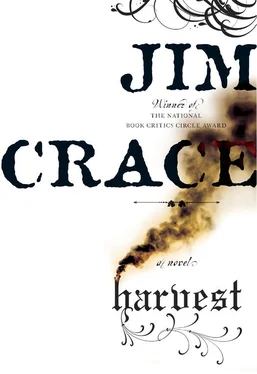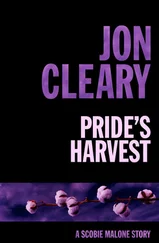Then I slept, though poundingly and fitfully. My dreams were punishing. I knocked on doors in them — but no matter what I did or said, no one would let me join them in their candlelight. Then my audience of friends and witnesses were standing at the bottom of the bed again, hard-faced. Mistress Beldam hurried forward, light-footed as a little deer, and pushed her velvet shawl into my mouth, to stop my cries of pain. She placed her tethering prong against my head above my ear. I could feel the metal in my dented skin. She hit it once. Then all the others took their turns in striking it home, double-handed, with the square and heavy stone that had killed Willowjack. Even Cecily. She was the cruelest of them all. She said, “It’s not enough. The ridge and furrow are not enough. You really haven’t done enough.”
What was soon clear, once I’d woken late this morning with a drumming head, not feeling brave at all, and gone outside to sober up on air again, was that the Beldams had spent the night in the best rooms of the manor. I was surprised by their audacity. I was not pleased, to tell the truth, though I suppose a couple as young and poor as them will have always wondered about the insides of a master’s house. If they’d ever hoped to sleep in airy space and any opulence, no matter how shabby, this might have been their only chance. I can imagine that they took Master Jordan’s bed, exactly as I had done the night before. I only chose the widow Gosse’s bed last night,rather than returning to the manor, because my evening there had seemed improper, afterward — though I am the manor-keeper for the moment. So if it was improper for me to wrap myself in Lucy Kent’s old riding cape and fall down in the cushioning of carpets, cloths and arrases, surely it was more so for these two passers-by. I’d thought that only bats would have it after me, at least until and if one of the masters came back in the spring. The Beldams are not bats.
I shamed myself by standing in the cottage lane as gray-faced and disapproving as a piece of slate and shaking my ale-sodden head at the mauvish scarf of smoke that was being woven from the lower chimney stack. They must have lit the oven in the scullery. I did not want to guess what they used for fuel, what furniture, what parchments, deeds or books. Or what it was they cooked for their first meals together since the dovecote fire. Or, come to that, what might have happened underneath her velvet shawl last night. I was resolved to hold my tongue. I’d keep away from them, and not only because I felt too ill for conversations of any kind. They were not my business anymore. If only I could find the courage and recover from my seven pots, then there were things to do for Cecily. I knew I hadn’t done enough for her.
I found my courage in the woods, by chance. I wanted to give dear Mr. Quill a final opportunity to show his face, to bare his waxy, trowel-shaped beard again. I’d call his name and let the echo seek him out. I took the lane toward the place where the Beldams first set up their den and followed round the outer edge of Turd and Turf, so silent then and glistening with last night’s rains. The storm had quelled the usual stench to some extent. The carcass domes were mostly hidden by the water. Had there been anybody there to follow me, I’d appear a halting figure with legs as weary as any oxen’s and shoulders as tucked as any goose’s. I could not help but stagger on the rougher ground. For once I felt like Mr. Quill must have felt since his sudden palsy as a child, wooden from the shoulder to the ribs, a man who was not fitted for outdoors. But still I did my best to not look to my left, despite the raucous foraging of our abandoned pigs, happy to be free and in the mire. I was in no hurry to discover evidence of Willowjack or what little remained of the short man from the pillory. Nor did I want just yet to risk discovering the body of my Mr. Quill. I’d rather believe for a few moments more what was most likely true. He had been warned. He ran away — or lurched away, I ought to say. He was already safe. But I had to be sure, or surer anyway, before I could feel free to lurch away myself.
The longpurples were beaten down by rain. You wouldn’t name it Blossom Marsh today. The major colors were the grayish-greens of goat-willows and the purple-browns of beech — but there was no sun to liven them or paint reflections in the flood. I found a raft of almost solid ground, then dared to look across the bog. There was an oblong monument of piled stones I hadn’t seen before. The Beldam daughter had been dutiful and loving, unobserved by us. She couldn’t let her father rest without a stone memorial. There wasn’t any sign of Mr. Quill’s distorted frame. Not above the surface anyway. So I spread my legs and cupped my hands and called his name, despite the head pain that the calling out intensified. I summoned “Mr. Quill” and “Mr. Earle,” until the two names caught the booming echo in the dell and merged to make a distant liquid L. The pigs were not disturbed at all. Shouting doesn’t bother them. But I was loud enough to set some rooks and pigeons in the air, and cause some crashing through the undergrowth. A deer. If Mr. Quill was in the woods or hiding somewhere underneath a roof, he would have heard — and recognized, I hope — my voice. I listened then. I half expected his reply. Nothing answered other than the echo, and the muffled sneezing of a skulking snipe. I must have tried a dozen times before I started swaying back toward the open fields.
I found the fairy caps growing in an oval ring between two exposed root arms under the goat-willow hedge which we have sometimes coppiced for fencing. At least, I think they were fairy caps. It is the time of year for fairy caps. I’ve seen some picked ones recently and believe I’d recognize their pointed parasols and purple gills. It seems a lifetime ago but it is hardly seven days since the Derby twins and Brooker Higgs jaunted along the lane in front of my cottage with their bloating faces and their bloated sack of toadstools. “Had any luck?” I’d asked them. Oh, what bitter luck indeed. I can still almost smell their forest spoils, the caps, the shawls, the giant moonball beneath their dampening of leaves and the smoky cloud of yellow spores. I think it’s reasonable to say that if it were not for their foraging, there would not have been that fire in the dovecote and the loft. There would have been no men in the pillory. There would have been no slaughtering of Willowjack, or anything that followed on from that. I would not have drunk so much or suffered this throbbing headache. The fairy caps must take the blame for everything. It makes less sense to say there would have been no pasturing of sheep before next spring, that Master Jordan has been conjured up, like a demon, by the young men’s flames, that without their flames he would have stayed where he belonged. In town. But I still feel the truth of it. The tinder of the giant moonball has brought misfortune to our land. The fairy caps have set our lives alight.
I think if I had not been wearied by the night and growing weary of myself, I might simply have passed those mushrooms by. But my body was still full of ale. I could smell it in my sweat and I could see it in my piss every time I stopped — and that was often, this morning — to relieve myself. My throat was sore from being sick. My head was, surely, just as tender as if it really had been hammered with a lump of stone and pierced with a metal prong. How else should I explain the deep crevice of pain behind my eyes? I had been split and ruptured by that half-imagined prong.
Of course, I was a novice in the arts of drinking heavily. I was not prepared for such harsh penalties. I was ashamed to be so vulnerable, but also — like all drunkards on the dawn; I’d seen this in my neighbors many times — I was just a bit pleased with myself, pleased at my capacity, pleased that I had lived to tell the tale, pleased to know the innards of a pot at last. I wished that at least some of my old friends could witness me today, especially the ones who’d always been suspicious of my levelheadedness, my reluctance to make myself insensible, no matter what the feast or celebration, no matter what misfortune had occurred. “You do not truly love the barley, Walt,” they said, a terrible rebuke, and more evidence of my timidity. “There’s no fermenting you.”
Читать дальше












